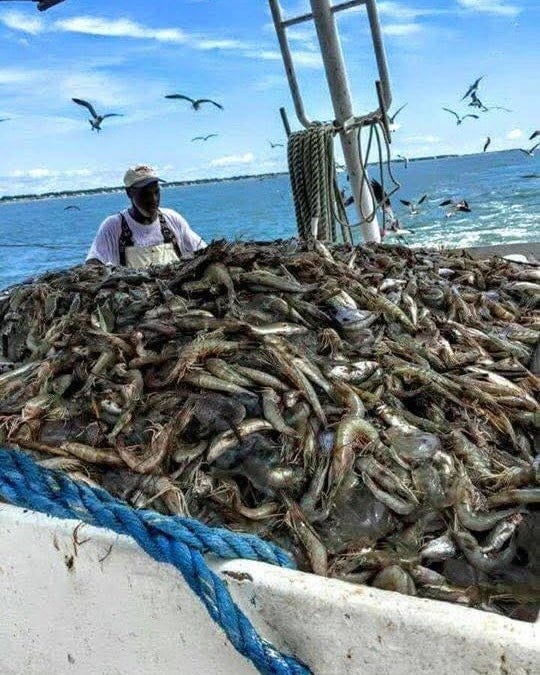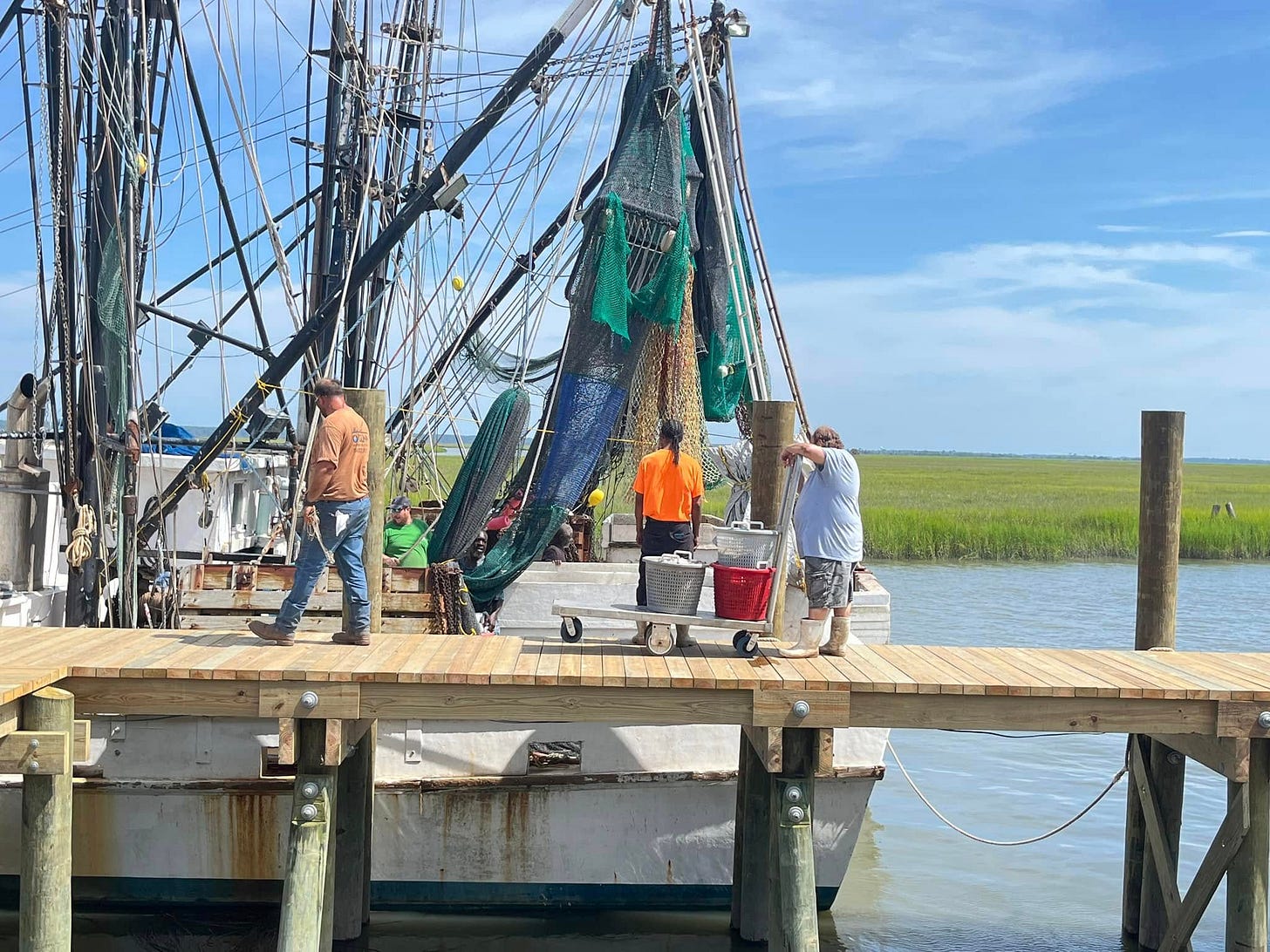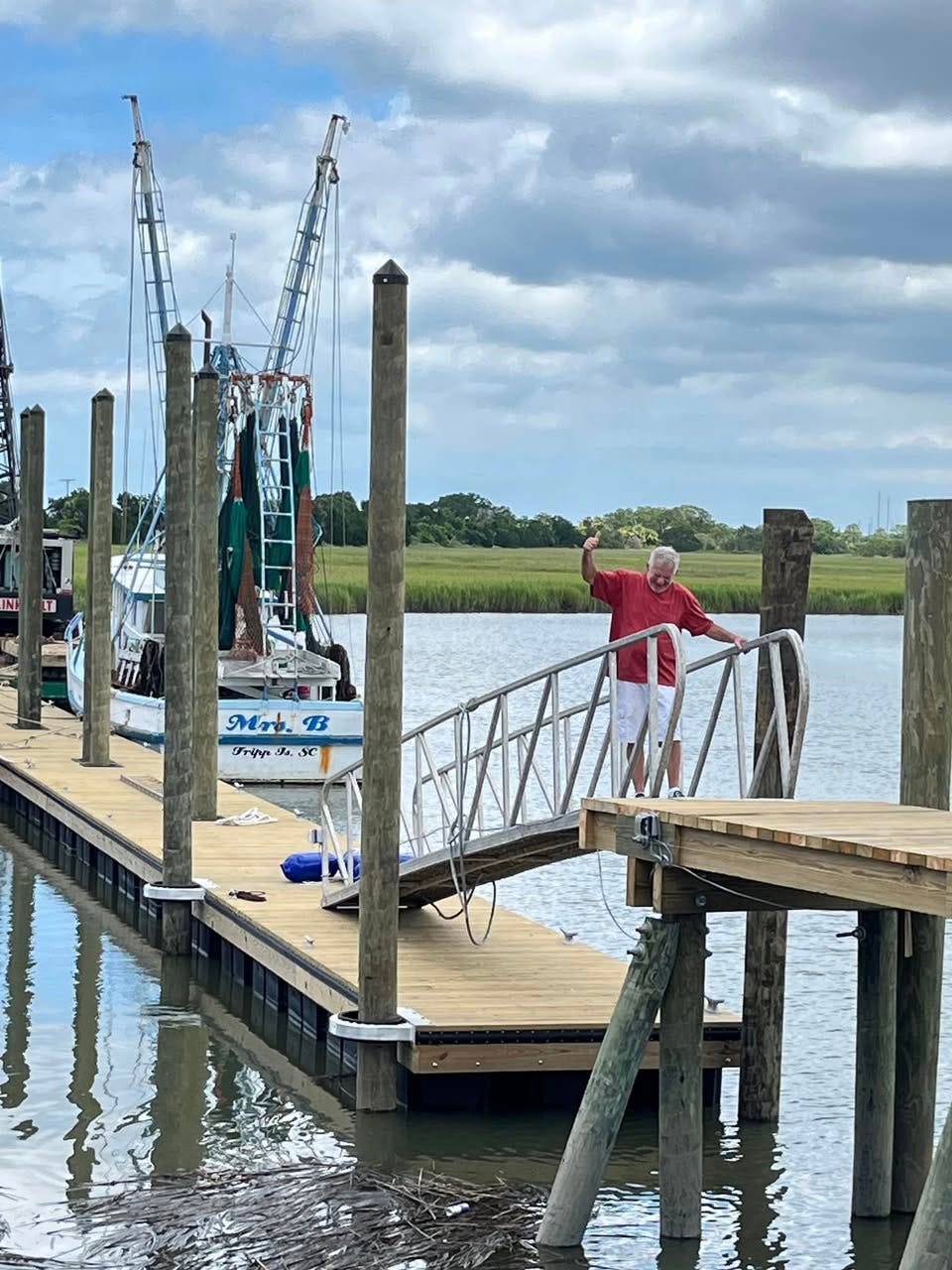The Rhythm of the Tide Never Lets You Go
The Call of the Sea
Whenever I find myself in Charleston, there’s a familiar pull, like the tide drawing me toward shore. It takes me straight to Little Jack’s Tavern, where I always order the shrimp burger. It arrives tucked inside a brioche bun so golden it seems kissed by the sun, topped with lettuce, a slice of tomato that tastes of summer, and a mayonnaise infused with herbs so bright and green they make me think of a kitchen garden. One bite and I am back home again, tasting the salt air of Beaufort, the memories of shrimp boats drifting into the docks at Village Creek tucked along the Morgan River. The rhythm of a tide never lets me go.
At home, on St. Helena Island, the Shrimp Shack has its own kind of magic. Hilda Upton’s shrimp burger is less refined, more honest, but no less wonderful. There, sitting on benches worn smooth by countless elbows and laughter, the air always carries the perfume of salt and fried shrimp. The breeze tangles my hair, gulls call overhead, and suddenly I imagine myself chasing fiddler crabs along the pluff mud flats. I linger there, stretching out the moment before crossing Highway 21 to Gay Seafood, hoping to catch the boats just as they return from sea, their green nets heavy with promise.
Autumn afternoons in Beaufort are meant for such pilgrimages. The sky softens, the marsh glows in a haze of green, and the air thickens with salty air. Gay Seafood has stood watch for more than seventy years, a family legacy of water and work. Live oaks guard their entrance, spreading their arms wide, cloaked in Spanish moss, guardians of both memory and toil. Shrimp boats, their hulls scarred from storms, line the dock. Their nets hang limp but alive, swaying like the skirts of dancers between songs. The smell of pluff mud rises, sharp and earthy, reminding me of everything that has ever lived and died in these waters.
It was here that I first met Mako, an old shrimper with skin like leather and eyes the color of a summer squall. He was eighty then, though the sea had carved him into something timeless. His boat, the Mrs. B, rocked gently as he waved me aboard. We sat together on the stern, drinking coffee that carried a whisper of diesel in the steam. He gestured toward the endless green marsh.
“See that marsh?” he said, voice low, gravelly. “That’s the nursery of the sea—the place where life begins.”
The tide had slipped back, exposing dark banks of pluff mud, and I could hear the faint crackle of life beneath the surface—tiny shrimp, crabs, and creatures unseen but vital. His words stayed with me, like scripture written not in ink but in tidewater.
But over the years, I’ve watched the view from those oak trees change. The once-busy river, thick with masts and rigging, has grown quieter. Shrimping, once the heartbeat of this coast, has been battered by imported shrimp, dwindling markets, and the loss of an unbroken chain of knowledge passed down from father to son. And yet—there are still the Whiteboot Heroes. Men and women who pull on their scuffed white rubber boots each dawn and answer the call of the sea. Their boots tell the story—mud-stained, salt-rimmed, worn from years of balance against a swaying deck.
I’ve spent time with Craig and Cameron Reaves, who keep the old ways alive at Sea Eagle Market. Before dawn, when most of Beaufort still dreams, their boats—the Gracie Belle and the Carolina Pride—slide into black water. The air is thick with diesel, the tang of salt, and the sharp comfort of hot coffee. Outriggers stretch from the boats like the wings of herons taking flight, and the winches groan to life as the heavy wooden trawl doors splash into the sea.
In those hours before sunrise, anticipation hums. The sea is black, unknowable, until the first haul rises, nets streaming with life. Shrimp tumble onto the deck, translucent and pink, mixed with silver fish flashing in the early light. The deck comes alive—the strikers perched on wooden stools, knives flashing, hands quick and practiced, seagulls screaming overhead. It’s chaos, it’s ritual, it's survival.
By midday, the smell of frying bacon and sausage drifts across the deck. Shrimp sizzle in cast-iron pans, biscuits split open in waiting hands. Meals at sea are not fancy, but they taste like heaven because they are earned.
In the evening, when the sun dips low and the gulls wheel above, the outriggers fold back and the boats turn toward home. They are tired, salt-streaked, but always ready for tomorrow. For the sea will call again, and they will go.
I think often of those Whiteboot Heroes. My own kitchen, my own table, has been blessed by their labor. I can still see friends gathered around….shrimp suppers on screened porches, platters passed down long tables, children reaching for seconds—these are the meals that define Lowcountry life.
And so, when I bite into a shrimp burger—whether at Little Jack’s in Charleston or Hilda’s Shack on St. Helena—I taste not just the sea, but the lives behind it. The boats, the nets, the weathered hands. The dignity of men who rise each morning to face the tide. The Whiteboot Heroes of Beaufort.
Tides of Tradition online cookbook presents Little Jack’s Shrimp Burger. Enjoy!





